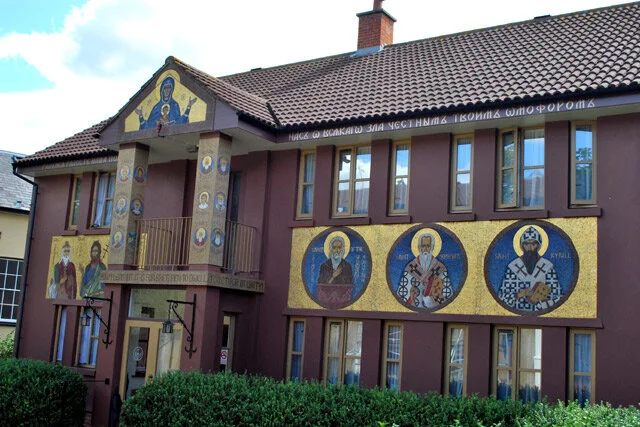On the Jesus Prayer- St Sophrony of Essex
Today is the feast day of St Sophrony of Essex, a saint in the Eastern Orthodox Church who reposed in the Lord on July 11 1993 and was canonized by the Ecumenical Patriarchate in November 2019. In 1958 St Sophrony, the spiritual child of St Silouan of Mt Athos, founded the monastery of St John the Baptist in Essex, the oldest Orthodox monastic community in England. This monastery is unique in that its program of communal prayer consists of the repetition of the Jesus Prayer for approximately two hours in the morning and two hours in the evening, alongside the Divine Liturgy which is celebrated three to four times a week. Another distinctive part of this monastery is that it is a double monastery whose community has both monks and nuns in separate residential quarters. If you find yourself in London, it is definitely worth arranging a short retreat at the monastery to experience the unique rhythm of prayer of the community.
St Sophrony of Essex
Below are some excerpts on the Jesus Prayer from St Sophrony’s book ‘On Prayer’
When we pray in a quiet solitary place quite often useless thoughts persistently gather about the mind, distracting attention from the heart. Prayer seems futile because the mind is not taking part in the invocation of the Name of Jesus- only the lips mechanically repeat the words. And when the prayer comes to an end, extraneous thoughts then generally go away, leaving one in peace. However, there is some sense in this tedious business: in invoking the Divine Name we set in motion all that is concealed in us. Prayer is like shafts of light cast on the dark depths of our inner life, showing us what passions or attachments are lodged in us. When this happens we must urgently pronounce the Holy Name, so that a feeling of repentance increases in the soul.
Lord Jesus Christ, Son of God, have mercy upon me, a sinner.
The Name of Jesus Christ for the believer is like a high fortress-wall. It is not easy for the enemy to cheat his way through the heavy iron gates if our attention is not distracted by outside concerns. The Jesus Prayer gives the soul the strength to resist harmful influences from outside. It does even more. It affords us the possibility to influence the milieu in which we live-to emerge, as I were, from the inner depths of our mind and heart and mix with our brethren in love and peace. Increasing peace and love, commanded by God, induce ardent prayer for the whole world. The spirit of Christ draws us into expanses of love embracing all creation so that the soul prays urgently:
Lord Jesus Christ, Son of God, have mercy upon me, a sinner.
We come to God as the worst of sinners. We frankly convict ourselves of every misdeed. We think of nothing, we seek nothing save forgiveness and mercy. This is our invariable inner state. We beseech God Himself to help us to not grieve the Holy Spirit by our abominable sins; not to let us cause any harm to our brother, to anyone. We condemn ourselves to the torment of hell as unworthy of God. We look for no special gifts from above but just try with all our might to perceive the true import of Christ’s commandments and live according to them. We appeal to Him
Lord Jesus Christ, Son of God, have mercy upon me, a sinner.
Invocation of the Lord’s Name gradually unites us with Him. This can happen to a certain degree when the one who is praying does not yet understand ‘WHO this is,’ and so far only vaguely senses the sanctifying power that proceeds from the Name. Every step forward, however, without fail entails an ever-deepening recognition of our sinfulness which reduces us to despair. Then with ever-increasing energy, we invoke the wondrous Name:
Lord Jesus Christ, Son of God, have mercy upon me, a sinner.
Cell Building at the Monastery of St John the Baptist, Essex
Main Chapel at the Monastery of St John the Baptist, Essex



